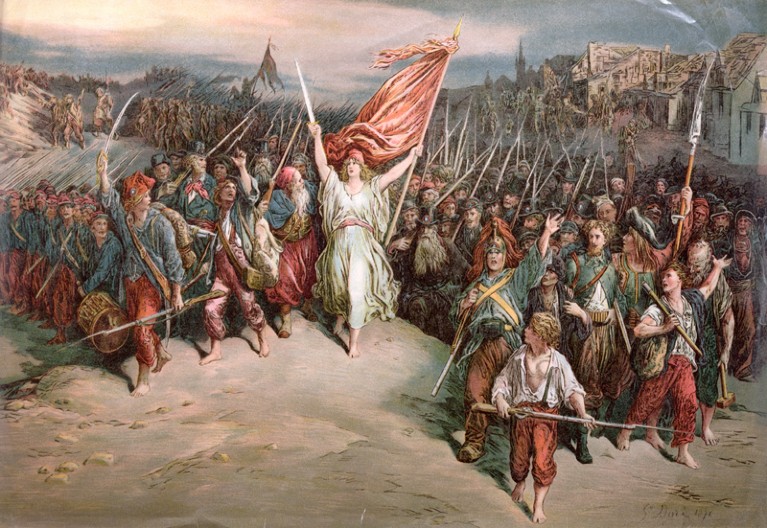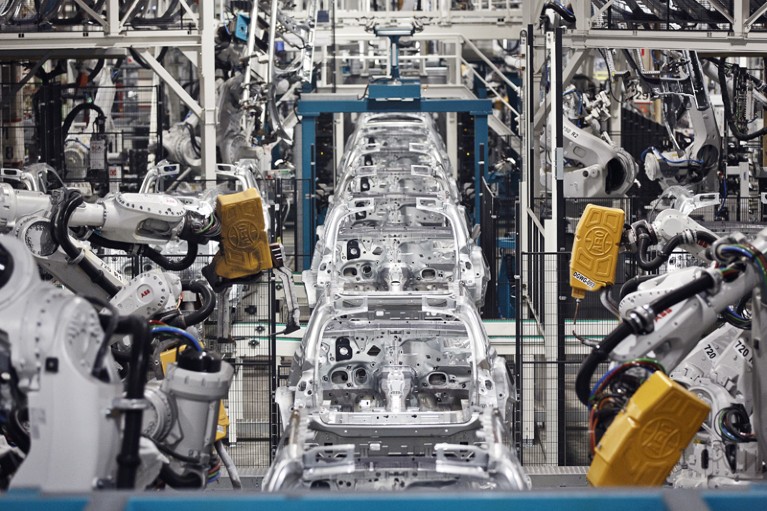
The Marseillaise (1870) by Gustave Doré: the French Revolution began with ideals of rationalism, but descended into chaos and conflict.Credit: Bridgeman Images
Enlightenment Now: The Case for Science, Reason, Humanism, and Progress Steven Pinker Viking: 2018.
Steven Pinker’s Enlightenment Now builds on his 2011 The Better Angels of Our Nature (Viking) in offering another engaging, compelling set of reasons to be cheerful. In this new combined survey, analysis and manifesto, he convincingly demonstrates that when it comes to health and life expectancy, poverty reduction and income, education, human rights, peace and security, the global data provide solid grounds for optimism. But the book’s premise lies in the past: the Enlightenment, that period in the eighteenth century when, Pinker argues, reason, science, humanism and progress became the centre of intellectual endeavour in Europe and North America. That legacy, he asserts, is ripe for resurrection at a time of political upheaval, the rise of demagoguery, climate scepticism and ‘fake news’.
The Enlightenment undoubtedly saw major advances in constitutional government. The separation of church and state in some nations allowed new models of society to flourish. But using the era as a premise is problematic. Many of the breakthroughs that Pinker attributes to the Enlightenment actually pre-date it. As Chris Kutarna and I showed in Age of Discovery (Bloomsbury, 2017), the Renaissance was a period of even more dramatic progress in science and the humanities, sparked by luminaries such as the astronomer Nicolaus Copernicus and the humanist Erasmus (see P. Ball Nature 452, 816–818; 2008). Before that were extraordinarily innovative epochs in Asia and other regions, such as China’s Tang dynasty (ad 618–907) and the Islamic Golden Age (750–1260).
Another issue we highlighted is that less salubrious aspects of change accompanied eras of rapid progress. During the Renaissance voyages of discovery, European sailors spread diseases that killed millions of indigenous Americans. Europe saw the rise of religious extremists — such as the demagogue Girolamo Savonarola, who ruled Florence in the 1490s — along with intolerance of diversity and science. Enlightenment advances were tied to empire building and the nascent Industrial Revolution, predicated not just on noble ideas and scientific curiosity, but also on slavery, genocide, exploitation and cultural triumphalism. Like the Renaissance, it ended in chaos and conflict, including the French revolutionary wars of 1792–99.
Both eras show that science and evidence-based thinking do not necessarily triumph over irrationality and ideology. Shared social norms and ethics are the framework that allows reason to prevail. Moreover, progress in science and society is a tapestry that cannot be unpicked through simple periodization. That said, comparing historical eras can be instructive. Although history does not repeat itself, it may rhyme; it can offer insights into predicaments and solutions, as I have found helpful, for instance, in conceptualizing the future of work. Many of the Enlightenment’s philosophical, social and scientific advances offer lessons for our reason-starved times, as Pinker ably argues; but context is key.
Although it is framed as a historically informed template for a new age of reason, Enlightenment Now ultimately becomes something else: an extended dismissal of the arguments of despair that Pinker fears are defining politics and crowding out an alternative approach rooted in rationality and global cooperation. He does not frame the thesis in economic terms. Yet he essentially defends globalization and the growth of market economies by claiming that it has brought more progress than any force in history. As an economist, I agree.
But globalization has also led to an escalation of risks. What is rational for individuals is increasingly irrational for society. The drivers of progress are rising incomes and connectivity; these also lead to greater negative spillovers and systemic risk. Managing globalization’s underbelly is essential, and the gulf between what needs to be done and what is being done is widening. Economic growth has come at the expense of ecosystems. Because nature does not respond to price signals (rhinos do not reproduce more when their horns are more valuable), increasing freedom of choice has led to overexploitation of a growing number of natural systems. Pinker does cite climate change, but as a worrying exception to a relentlessly positive narrative, rather than as the most glaring example of a wider failure of global commons management.

Robots construct cars at a Mercedes-Benz plant in Finland.Credit: Bloomberg/Getty
Pinker devotes a chapter to inequality. Drawing on the encyclopaedic website Our World in Data by economist Max Roser of the Oxford Martin School, UK, he shows that global inequality (between richer and poorer countries) is decreasing, whereas inequality within countries is rising. He concludes that much current anxiety around inequality — spurred by the idea that the top 1% is absorbing the lion’s share of economic growth — is misplaced. I don’t agree. First, the data he presents do not reflect recent sharp economic reversals in many places. These are likely to become more significant in some regions. For instance, in the United States, cuts to health-care subsidies and corporate tax rates over the past few months will reduce redistribution and weaken the safety nets that (as Pinker identifies) helped to alleviate inequality after the 2008 financial crisis.
Second, he does not give enough weight to the plight of the jobless — and, in the United States, its association with the growing problem of opioid misuse — or the threat that robots and artificial intelligence (AI) pose to jobs. Growing inequality within countries is undermining social cohesion and promoting extremist political views, and this is likely to be compounded by technological change.
If most tasks that are repetitive and do not demand dexterity are automated — which is possible, according to research at the Oxford Martin School — what is the model of future employment in administrative back offices, call centres or manufacturing? Pinker is too sanguine about such immediate threats (although he argues cogently in favour of minimizing the expenditure of intellectual and political capital on remote risks, such as the existential threat posed by AI). He also underestimates the threats that Mike Mariathasan and I set out in our 2015 book The Butterfly Defect (Princeton University Press): interconnected systems raise interdependence, complexity and systemic risk. With globalization, as connectivity, incomes and consumption grow, so risks become multidimensional and transnational — witness pandemics, cascading financial crises and cyberattacks. New technologies turbocharge these risks and give new powers to individuals and small groups.
Pinker looks in some depth at the rise in scepticism about science, in society and in parts of academia such as the humanities. He gives shorter shrift to the erosion of faith in expertise elsewhere, even though this is justified in some notable instances. The financial sector, for example, is home to the biggest and most powerful global expert system, from banks and treasuries to the International Monetary Fund. The 2008 financial crisis highlighted the inadequacy of that system, whose primary mission is financial stability. Similarly, accounting firms have given clean bills of health to corrupt or collapsing enterprises. The denial of evidence is irrational, but it is not necessarily irrational to challenge experts and authorities.
Pinker highlights the importance of ideas in human advances, but claims that “intellectuals hate progress” — a surprising generalization in a case for evidence and reason. And herein lies both the strength and weakness of this book. It provides copious reasons for optimism. It claims to be a scientific, evidence-based account; but that is undermined by its scant attention to the mounting evidence on new risks. I share Pinker’s optimism that this could be our best century, in which poverty and many of the challenges humanity has historically confronted are addressed. Yet there is also a real potential for dystopian outcomes as sea levels, strife, temperatures and resistant infections rise, and biodiversity, democratic institutions, social ties, mental health and resource security are eroded. We need to face up to these and other daunting challenges while nurturing the positivity required to tackle them.
Enlightenment Now is not a balanced account of the present or future. But for the many overwhelmed by gloom, it is a welcome antidote.

 A farewell to arms
A farewell to arms
 Nature special: The future of work
Nature special: The future of work
 Singular currency
Singular currency
 The architecture of inequality
The architecture of inequality





